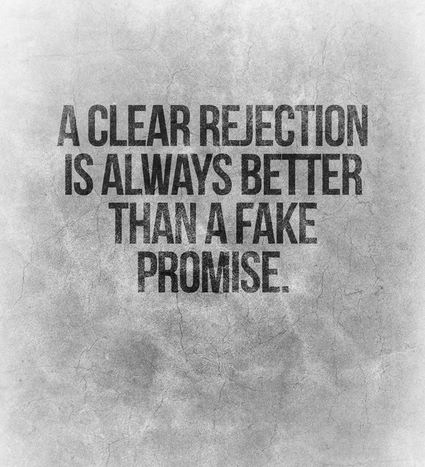Rejection always hurts.
From the lack of an invite to a classmate’s party to the failure of a job offer, we feel the pain of being dismissed.
And when that rejection slip comes from our partner?
Let’s just say the pain is searing. Unescapable.
fMRI results have shown that the agony of rejection follows the same neural pathways as physical pain. It is real. And it can be devastating.
We all have an innate drive to want to be accepted. To be recognized and wanted. As social creatures, we have evolved to need the group and to fear being ostracized.
The worst feeling in the world is not to be seen and hated. It is to be invisible and discarded.
When rejection from relative strangers occurs, we often rationalize the reasons:
“I wasn’t invited to the party because she is a stuck-up snob.”
“They didn’t accept my proposal because they’re short-sighted morons.”
“He didn’t call me back because he lost my number.”
“I was passed over for the job because I am over-qualified.”
It’s easy to perform this ego-preserving mental choreography when we do not intimately know the rejector and the rejector does not fully know us. We can depersonalize the experience, shifting the reasons for the refusal to the other person while protecting our own sense of self and worth.

But when the rejection comes from the one that knows you best?
The one that promised he or she would always be there?
The one with whom you felt safe exposing your deepest fears and greatest vulnerabilities?
It’s personal.
I felt like I was discarded like so much garbage. No longer able to provide utility or beauty. Lacking in key features as I was replaced with a newer model. I trusted this man, had valued his opinions for years. So when he indicated I wasn’t enough, it was easy to believe him.
I think my desperate quest to label him was not only coming from a need to understand why, but also from a need to prove that his judgement was somehow faulty. That I was rejected because of something in him rather than something in me.
It’s so difficult not to internalize intimate rejection.
We all too easily assume that because it happened to us, it must have happened because of us. Sometimes we’re just collateral damage.
We take rejection by our partners personally.
He or she turns down a proposal of sex? It must because of the five extra pounds you’re carrying.
He or she is withdrawn? You must have said or done something to make him or her angry.
He or she requests time alone? It must be because you’re not wanted.
Yet much of the time, what we perceive as a personal attack has more to do with our partners than ourselves.
Perhaps sex was refused because of pressures at work.
Maybe the withdrawing was due to a sense of being overwhelmed.
And the alone time may just be a need to breathe.
Don’t let one person determine your value.
One of the biggest problems of internalizing rejection within a relationship is that it lays the groundwork for the marriage-destroying pursuer-distancer dance. The more the rejected partner feels abandoned, the more he or she desperately pursues attention and affection. The more the distancer feels hounded, the more he or she retreats and withdraws.
It’s a common pattern. And often a deadly one, slowly starving the marriage of trust and intimacy. If you feel rejected, it’s easy to respond with a frantic attempt to be wanted.
And when the rejection comes at the end of a marriage?
It’s all too easy to respond the same way. Looking for worth and validation from anyone that will provide it. And holding on too tightly will suffocate any relationship.
Your worth can only come from within. And no rejection can ever take that away.
Rejection is about opinion, not fact.
When someone we love suddenly makes claims that we are substandard, we often believe them. Take their assertions as facts. Truth.
When they are actually opinion.
Opinion that may easily be influenced by other factors.
When I first read the suicide note that my ex sent to his other wife and my mother, I felt worthless. He spent full paragraphs discussing how impossible I was followed by more paragraphs singing the other wife’s praises.
Of course he did. By demonizing me, he justified his actions. By discounting me, he secured his own value. And by praising her, he stood a chance of winning her back.
I was rejected because he could not continue to hide the truth.
I was rejected because he needed an escape.
I was rejected because he convinced himself that I had already rejected him.
I was rejected because of his opinions. And I no longer care what he thinks.
It’s a delicate ego dance learning to sift through the facts of the rejection to see if there is some truth to be learned.
Cheaters and deceivers often try to place the burden of the blame for their actions at the feet of their spouse. They act out of selfishness and greed and then claim that “you made me do it.” Yet nobody ever makes anyone else do something. Their choices are theirs alone.
Still, sometimes there is a bigger picture. Nothing you did or didn’t do make your partner act a certain way. But that doesn’t mean you have nothing to learn.
There is a difference between taking the blame for someone else’s actions and accepting responsibility for your own.
One man’s trash is another person’s treasure.
Just because one person took you out to the curb, doesn’t mean you have to stay there.
Reject their opinion of you and form your own.
Someone will see you for the treasure you are.



